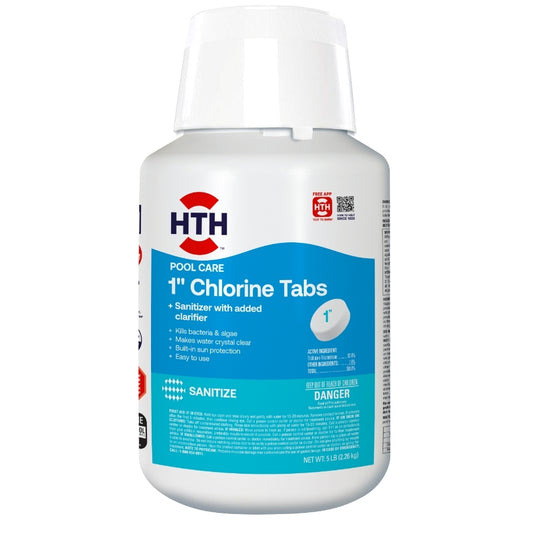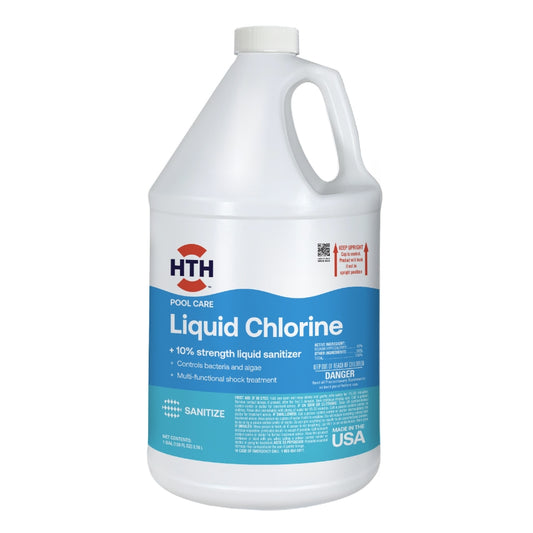Are salt water pools better?

Need more help?
Call us
Prefer to call us?
We've got someone standing by daily from 9 a.m. – 7 p.m. ET, Monday – Friday
(866)-HTH-POOL- Category:
- Pool •
- Pool Care Education •
- Saltwater •
Are they? I mean, you hear a lot about the benefits of salt water, it seems like a more “natural” option, but is there really a difference that’s worthy of installing a salt chlorine system – typically referred to as a salt water system in your backyard swimming pool. If you're in the market for a new swimming pool or considering converting your pool to salt water, you might be evaluating whether a salt chlorine system (salt water) or a traditional chlorine system is truly “better.” And really, it depends on what your parameters are for a “better” pool experience. Here, we'll talk about some of the differences between a salt chlorine / salt water system and a traditional chlorine system to help you make your decision.
What Is a salt water pool?
Well, there’s a misconception with salt water swimming pools that they don't contain chlorine, when in reality, salt water pools do actually contain chlorine – they just create chlorine differently than pools using a traditional chlorine system.
When you have a chlorine pool system, pool owners treat the pool water with a traditional chlorine sanitizer in the form of chlorinating tablets, sticks or liquid chlorine. Salt water pools, on the other hand, use a salt chlorine generator to create chlorine at a steady pace. So instead of adding chlorine sanitizers to the pool water, you add salt directly to the pool water and the generator converts the salt to chlorine. So, there’s actually chlorine in both salt water and chlorine pools, but the experience for pool owners may be a bit different.
The salt water swimming experience
The biggest worry among pool owners is that a salt water pool will give you the same gag-worthy effect as ocean water. Like, wow, is it beautiful, but accidentally get a mouthful of ocean water and you'll think you took a straw to the Morton Salt canister and lose your appetite for the afternoon. And if you've ever opened your eyes in the ocean, you'll know what it feels like to stare longingly into the front end of a fiery hot hair dryer.
Good news though. Salt chlorine (salt water) swimming pools don't have anywhere near the salinity of ocean water, so the swimming experience is actually quite lovely. The salt taste of a salt water pool is really mild – like human tears or saline solution you’d use with your contacts. The typical salt range for a salt water pool is around 3,000 to 4,000ppm or about 1/10th of the salinity of the ocean.
You'll also notice that the feel of the water itself feels smooth and silky and generally softer on your skin.
Beyond the taste, your experience after getting out of a salt water swimming pool may be different from chlorine systems – and you may really like the benefits. According to the folks at wellandgood.com, “salt water actually helps with acne because it sterilizes the skin.” Salt helps exfoliate the skin making skin smoother. Salt also has natural anti-inflammatory properties that can help clean and heal wounds.
The Cost of a Salt Water Pool
First, there is the initial cost of the generator ($500 to $1500) plus a replacement cell every three to five years. To maintain a salt water pool in good condition with a properly working generator, you might spend around $100 or less per season on salt. A chlorine pool may cost you about the same or just a bit more depending on the size and sun intensity, as chlorine tablets – while still very affordable – will naturally cost you a bit more than salt at around $100 to $150 for the season. The trade-off though, is that you will likely spend more in electricity to run your salt water generator, since your equipment will be working hard to maintain the proper sanitizer level.
The Convenience of a Salt Water Pool
Pool maintenance certainly influences your decision on the type of pool system you might like to have. Now, with all pool types you will still have to test your pool water and balance your pH, alkalinity and calcium hardness. You will also still have to add shock to your pool when needed. Pool shock can be applied to both salt water pool systems and chlorine pool systems to boost the chlorine level in a hurry – a need that’s based on pool usage, weather and other environmental factors and not on the type of system you have. Chlorine systems require weekly (or sooner) maintenance with applying chlorine tablets and sticks – a pretty painless process but a requirement nonetheless. A salt water system may require applying salt less often – in some cases every two weeks depending on your levels. To make sure you maintain a clean, clear swimming pool, just remember to test your pool water weekly and after rain and a lot of use.
Finally, no pool type is immune to algae unfortunately. So both salt water and chlorine pool systems may require the application of phosphate removers and/or algaecide (in addition to shock treatments) to kill and prevent mustard, green or black algae.
But the plants!
It’s true. Because of the chlorine in the water, all pool water types can affect the foliage surrounding your swimming pool. However, salt water can be just as aggressive if not more impactful to plants and shrubs. So no matter which type of pool you have, plan accordingly when landscaping your pool by distancing plants and trees from splash zones.
Hopefully you've found this helpful. For more on chlorine systems, check out our article on "Is shock and chlorine the same?”
As always, we’re here to help. If you have questions, contact our help line at 1-866-HTH-POOL or talk to our experts with our live chat!
Caution
Please read the following important reminders before adding pool chemicals to water:
• NEVER mix products together or dissolve before use.
• ONLY enter pool when FAC levels are below 4 ppm to prevent risk of bodily harm.




